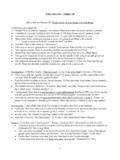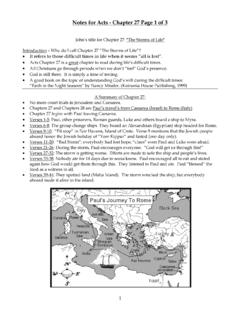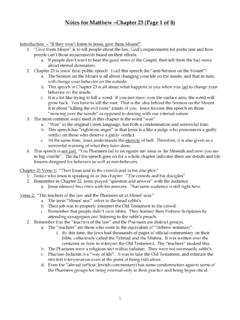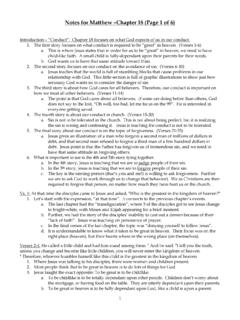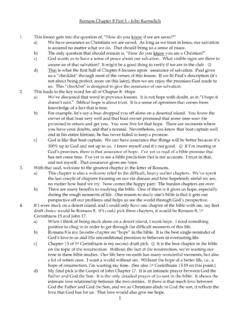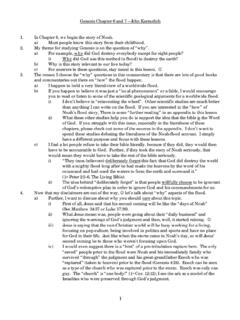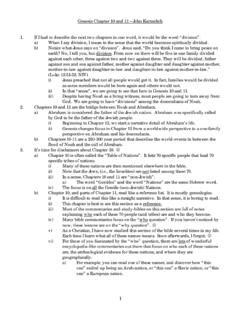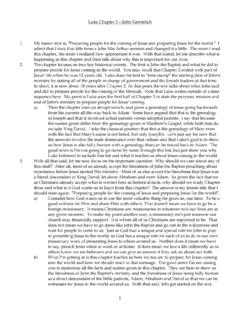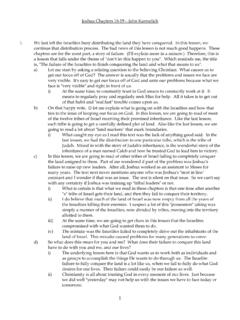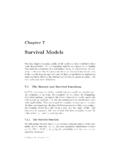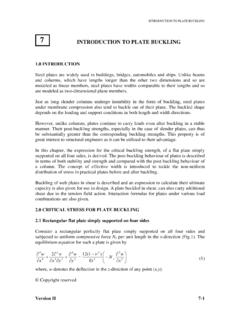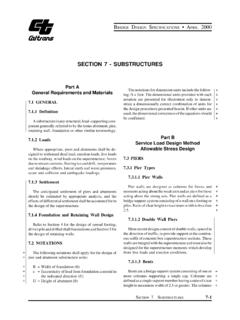Transcription of Notes for Matthew –Chapter 22 (Page 1 of 7)
1 Notes for Matthew chapter 22 (Page 1 of 7). Introduction Part 1 The Silence is Deafening . 1. That's an old clich that means the lack of a verbal response by a person or a group can say as much as if the person did verbally respond. 2. In chapter 22 we have 5 stories. All five end with a very loud silence from the crowd. 3. The first story is Jesus telling a parable about a wedding feast. (Verses 1-14). a. The purpose is to tell who is and who is not coming to heaven. b. The purpose was to put-down the religious Jews and to show their lack of faith in Jesus will cost them their eternal salvation. c. What is noticeable about this parable is a lack of response by the Pharisees. 4. The 2nd story is Jesus answering the question, Is it lawful to pay taxes to Caesar? (Verses 15-22). a. The Pharisees sent their disciples to trap Jesus into taking sides on a controversial debate. b. When Jesus gave his answer, again their silence is deafening.
2 5. The 3rd story is about the Sadducees asking about the resurrection. (Verses 23-33). a. Sadducees were a Jewish denomination that didn't believe in the resurrection concept. b. They were attempting to trap Jesus with their question. c. Again, when Jesus gave his answer, again their silence is deafening . 6. The 4th story is some Pharisees asking, Which is the greatest commandment? (Verses 34-40). a. This may have been another attempt to trick Jesus as the Pharisees debated among themselves which is the greatest of all the bible commandments. b. Again, the text has a very loud lack of response to Jesus' answer. 7. The 5th and final story is Jesus asking the Pharisees about just who is the Messiah. (Verses 41-46). a. Notice the last verse in this chapter : No one could say a word in reply, and from that day on no one dared to ask him any more questions. ( Matthew 22:46, NIV). 8. In every case, you can see how Jesus is the final authority in a debate.
3 A. One cannot out debate Jesus , or the word of God for that matter. b. The mistake we make is we try to use our own wits to defend Christianity as opposed to simply quoting the bible itself. Introduction Part 2 Clues about life in heaven: 1. Several of these stories also give us a few clues as to what life in heaven is like: 2. The first parable about the wedding banquet teaches us who is invited to heaven. 3. The third story talks about lack-of-marriage in heaven and how believers are like angels . We will discuss that point when we get there. chapter 22 Verse 1: Jesus spoke to them again in parables, saying: . 1. The last part of chapter 21, Verses 28-46 had two parables: a. The parable of the two sons (one did what father wanted, other did not). b. The parable of vineyard owner and the tenants who refused to pay the rent. 2. chapter 22 now opens with the 3rd parable in a trilogy on the theme of salvation.
4 3. In the first 2 parables, Jesus commented after each one how they are illustrations about salvation. Verse 2: "The kingdom of heaven is like a king who prepared a wedding banquet for his son. 1. The term kingdom of heaven has several meanings in the bible. a. It can refer to believers on earth, here on earth or it refers to believers in heaven. 2. We, as believers in the church, are the Bride of Christ . a. Let us rejoice and be glad and give him glory! For the wedding of the Lamb (Jesus) has come, and his bride (us) has made herself ready. (Rev. 19:7, NIV). b. Then the angel said to me, Write: Blessed are those who are invited to the wedding supper of the Lamb! (Rev. 19:9a, NIV). 1. Notes for Matthew -- chapter 22 (Page 2 of 7). Verse 2 (cont.). 3. Religious Jews also understood that that the Jewish nation is referred to in the Old Testament as the God's bride in the sense that even though they have been unfaithful many times, God is committed to Israel despite of her faults.
5 A. The LORD said to me (Hosea), Go, show your love to your wife again, though she is loved by another and is an adulteress. Love her as the LORD loves the Israelites, though they turn to other gods and love the sacred raisin cakes (the raisin cakes refers to other gods). (Hosea 3:1, NIV). Verse 3: He sent his servants to those who had been invited to the banquet to tell them to come, but they refused to come. 1. A custom of that time for a king's banquet is to have a double-invitation . a. First, the invitations are sent saying the king is going to have a banquet and give the rough time (as opposed to exact time) of the banquet. b. The second invitation is when the wedding announcers say, Come on, now is the time.. 2. The last phrase of Verse 3 is one of the saddest in the chapter : but they refused to come.. a. The point is Jesus is the king's son , and even though Jesus is legitimately the king's son, the resentment by Pharisees of that fact means they wouldn't come.
6 Verse 4: "Then he sent some more servants and said, `Tell those who have been invited that I have prepared my dinner: My oxen and fattened cattle have been butchered, and everything is ready. Come to the wedding banquet.'. 1. The invitee's refused the invitation, so God sent more messengers. 2. God knows all things. God knows in people's hearts that they refused the first invitation. But out of God's love, he is pleading with those who were invited to please come. God understands the consequences of eternal hell better than those who were invited. 3. This parable refers to the Nation of Israel. Remember that because God picked the Nation of Israel to bring the Messiah into the world, they get the first invitation to the wedding banquet . a. Paul said, I am not ashamed of the gospel, because it is the power of God for the salva- tion of everyone who believes: first for the Jew, then for the Gentile.
7 (Romans 1:16, NIV). 3. What if the Jewish nation accepted Jesus? a. We don't know the answer. We do know that God knows all things in advance, and knew they would reject Jesus. That was part of God's overall plan to have people of all races as believers in Christ. Verse 5: But they paid no attention and went off--one to his field, another to his business.. 1. The people invited to wedding were more interested in their business than the kings. 2. Nothing much has changed today. Most people are more interested in other activities than going to church. Verse 6: The rest seized his servants, mistreated them and killed them.. 1. I take the view the largest number of people in hell will be those who simply ignored Jesus and tried to be neutral. Those are the people in Verse 5. 2. Verse 6 represents another group: Those who actively opposed the Gospel message. a. The group in Verse 5 paid no The group in Verse 6 killed.
8 B. Verse 6 also represents those who don't want to hear the Gospel message. c. They don't want anyone to convict them of their sins, so they kill the messenger . 2. Notes for Matthew -- chapter 22 (Page 3 of 7). Verse 7: The king was enraged. He sent his army and destroyed those murderers and burned their city. 1. This verse implies that non-believers only get so many chances and that's it. 2. Remember that the people who refused to come were busy doing their business . 3. Here in Verse 7, the king burned their city. 4. Stop and think of all the effort people do to have more stuff . They work so hard as to ignore God to get more stuff. Now the king is burning their stuff . 5. I'm not saying we have to take a vow of poverty. We just have to have the proper perspective of life on this earth as compared to eternal rewards. Verses 8-10: "Then he said to his servants, `The wedding banquet is ready, but those I invited did not deserve to come.
9 9 Go to the street corners and invite to the banquet anyone you find.' 10 So the servants went out into the streets and gathered all the people they could find, both good and bad, and the wedding hall was filled with guests. 1. Notice in Verse 8 it says, those I invited did not deserve to come.. a. Jesus was speaking to people who spent their life studying the Old Testament. Yet, the message is they don't' deserve to come. b. That's the Gospel message. Your entrance into heaven is not based on how good you are, but on the question, What have you done with my son Jesus? . 2. Verses 9-10 say in effect, I'm the king and I'm having a party and a party needs guests. Go get anybody who's willing to come. I don't care what they are like as long as they are willing to come (notice the phrase good and bad in verse 10). 3. Remember that Matthew wrote this to a Jewish audience. Their view of heaven is that it is only for Jews or Jewish converts who obey God's commandments.
10 A. For Jesus to imply that anyone could come to heaven simply by accepting the kings (God's) invitation is a difficult concept to accept. Verses 11-12: "But when the king came in to see the guests, he noticed a man there who was not wearing wedding clothes. 12 `Friend,' he asked, `how did you get in here without wedding clothes?' The man was speechless. 1. A wedding banquet of that time, especially one given by the king, required special wedding clothes. There is a garment-at-the-door waiting for you as you come in. a. For someone to not where that garment, you are making the statement, I'm here, but I. don't want to be here.. 2. A few verses back, we had those who refuse to come be killed. So in this parable, who does this not-dressed-properly person represent? a. Most commentators argue that it represents false believers within the church. It represents those who come to church but don't really have a heart for Jesus.
